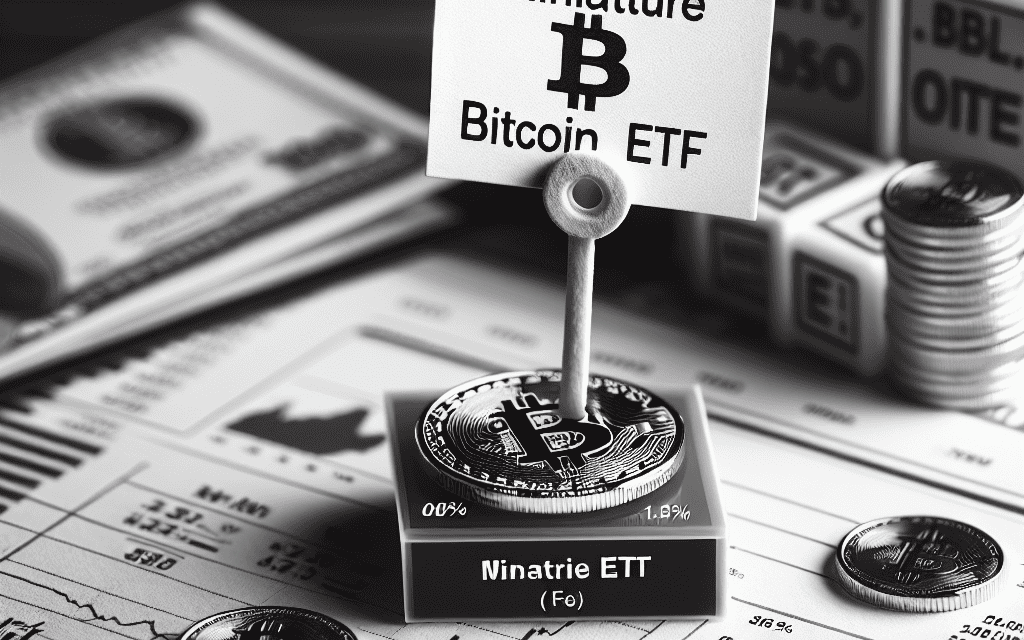“Grayscale’s Mini Bitcoin ETF: Big Opportunities, Tiny Fees.”
Introduction
Grayscale, a leading digital asset management firm, has introduced its Mini Bitcoin ETF, marking a significant development in the cryptocurrency investment landscape. This new offering is designed to provide investors with a more accessible and cost-effective way to gain exposure to Bitcoin, featuring a competitive management fee of just 0.15%. The launch of the Mini Bitcoin ETF underscores Grayscale’s commitment to expanding its suite of investment products and making cryptocurrency investments more approachable for a broader audience. By offering a lower fee structure, Grayscale aims to attract both retail and institutional investors seeking to diversify their portfolios with digital assets while minimizing costs.
Understanding Grayscale’s Mini Bitcoin ETF: A New Era in Cryptocurrency Investment
Grayscale’s recent introduction of its Mini Bitcoin ETF marks a significant milestone in the evolving landscape of cryptocurrency investment. This new financial product, characterized by its notably low fee of 0.15%, is designed to attract a broader range of investors by offering a more accessible and cost-effective way to gain exposure to Bitcoin. As the cryptocurrency market continues to mature, the launch of such innovative investment vehicles underscores the growing acceptance and integration of digital assets into mainstream financial systems.
The Mini Bitcoin ETF by Grayscale is particularly noteworthy for its competitive fee structure. Traditional Bitcoin ETFs often come with higher management fees, which can deter potential investors who are cautious about the costs associated with cryptocurrency investments. By setting the fee at 0.15%, Grayscale aims to lower the barrier to entry, making it an attractive option for both seasoned investors and newcomers to the cryptocurrency market. This strategic move not only enhances the appeal of the ETF but also aligns with the broader trend of fee reduction in the financial industry, as investors increasingly seek cost-efficient investment solutions.
Moreover, the introduction of the Mini Bitcoin ETF reflects Grayscale’s commitment to innovation and its responsiveness to market demands. As one of the leading asset managers in the cryptocurrency space, Grayscale has consistently been at the forefront of developing products that cater to the evolving needs of investors. The Mini Bitcoin ETF is a testament to this commitment, offering a simplified and streamlined investment option that allows investors to gain exposure to Bitcoin without the complexities and risks associated with direct ownership of the cryptocurrency.
In addition to its low fee, the Mini Bitcoin ETF provides investors with the benefits of diversification and liquidity. By investing in the ETF, individuals can gain exposure to Bitcoin as part of a diversified portfolio, thereby mitigating some of the risks associated with the volatility of the cryptocurrency market. Furthermore, the ETF structure offers enhanced liquidity, enabling investors to buy and sell shares with ease, similar to trading stocks on a traditional exchange. This liquidity is a crucial factor for investors who value the ability to quickly adjust their positions in response to market fluctuations.
The launch of Grayscale’s Mini Bitcoin ETF also signifies a broader shift in the perception of cryptocurrencies within the financial industry. As regulatory frameworks continue to evolve and mature, institutional and retail investors alike are increasingly viewing digital assets as a legitimate and viable component of a diversified investment strategy. The introduction of products like the Mini Bitcoin ETF not only facilitates greater participation in the cryptocurrency market but also contributes to the ongoing dialogue about the role of digital assets in the global financial ecosystem.
In conclusion, Grayscale’s Mini Bitcoin ETF represents a pivotal development in the realm of cryptocurrency investment. With its low fee structure, ease of access, and potential for diversification, the ETF is poised to attract a wide array of investors seeking exposure to Bitcoin. As the financial industry continues to adapt to the growing prominence of digital assets, the launch of such innovative products will likely play a crucial role in shaping the future of investment strategies. Through initiatives like the Mini Bitcoin ETF, Grayscale is not only expanding its product offerings but also reinforcing its position as a leader in the cryptocurrency investment space.
The Impact of Grayscale’s 0.15% Fee on Bitcoin ETF Market Dynamics
Grayscale’s recent introduction of a mini Bitcoin Exchange-Traded Fund (ETF) with a remarkably low fee of 0.15% has sparked considerable interest and discussion within the financial community. This move is poised to influence the dynamics of the Bitcoin ETF market significantly, as it introduces a new competitive element that could reshape investor preferences and market strategies. To understand the potential impact of Grayscale’s offering, it is essential to consider the broader context of the Bitcoin ETF landscape and the implications of such a low fee structure.
Historically, Bitcoin ETFs have been characterized by relatively high management fees, often ranging from 0.5% to 1% or more. These fees have been a point of contention for investors seeking cost-effective ways to gain exposure to Bitcoin without directly purchasing the cryptocurrency. Grayscale’s decision to set its fee at 0.15% represents a strategic attempt to capture a larger share of the market by appealing to cost-conscious investors. This move could potentially pressure other ETF providers to reevaluate their fee structures, leading to a more competitive environment that benefits investors.
Moreover, the introduction of a mini Bitcoin ETF with such a low fee could democratize access to Bitcoin investments. By lowering the cost barrier, Grayscale is making it more feasible for a broader range of investors, including retail investors, to participate in the Bitcoin market. This democratization could lead to increased liquidity and trading volume, as more individuals are able to invest in Bitcoin through a regulated and accessible financial product. Consequently, this could enhance the overall stability and maturity of the Bitcoin market, as a more diverse investor base contributes to price discovery and market resilience.
In addition to attracting new investors, Grayscale’s mini Bitcoin ETF may also prompt existing investors to reconsider their current holdings. Investors who have previously allocated funds to higher-fee Bitcoin ETFs might be incentivized to switch to Grayscale’s offering to reduce their investment costs. This potential shift in investor behavior could lead to a redistribution of assets within the Bitcoin ETF market, as funds flow from higher-fee products to Grayscale’s more cost-effective option. As a result, other ETF providers may need to innovate and differentiate their offerings to retain their market share, potentially leading to the development of new features or services that enhance the overall value proposition for investors.
Furthermore, Grayscale’s competitive fee structure could have implications beyond the Bitcoin ETF market. It may set a precedent for other cryptocurrency-related financial products, encouraging providers to adopt similar low-cost strategies to attract investors. This could lead to a broader trend of fee compression across the cryptocurrency investment landscape, ultimately benefiting investors by reducing the overall cost of accessing digital assets.
In conclusion, Grayscale’s launch of a mini Bitcoin ETF with a 0.15% fee is a significant development that has the potential to reshape the dynamics of the Bitcoin ETF market. By introducing a low-cost option, Grayscale is challenging existing fee structures and encouraging greater participation from a diverse range of investors. This move could lead to increased competition, innovation, and accessibility within the market, ultimately benefiting investors and contributing to the continued evolution of the cryptocurrency investment landscape. As the market responds to this new offering, it will be crucial to monitor how other ETF providers adapt and how investor behavior evolves in response to this competitive shift.
How Grayscale’s Mini Bitcoin ETF Compares to Traditional Bitcoin Investment Options
Grayscale’s recent introduction of its Mini Bitcoin ETF, featuring a competitive fee of 0.15%, marks a significant development in the landscape of cryptocurrency investment. This new offering is poised to attract both seasoned investors and newcomers alike, as it provides a more accessible and cost-effective means of gaining exposure to Bitcoin. To understand the implications of this launch, it is essential to compare the Mini Bitcoin ETF with traditional Bitcoin investment options, such as direct purchase, Bitcoin futures, and other cryptocurrency funds.
Firstly, direct purchase of Bitcoin has long been the most straightforward method for investors seeking to own the digital asset. This approach allows investors to hold Bitcoin in their digital wallets, providing them with full control over their assets. However, it also requires a certain level of technical knowledge and security awareness to manage private keys and protect against potential cyber threats. Additionally, the volatility of Bitcoin’s price can pose significant risks, making it a less attractive option for risk-averse investors.
In contrast, Grayscale’s Mini Bitcoin ETF offers a more structured and regulated investment vehicle. By investing in the ETF, investors can gain exposure to Bitcoin without the need to directly purchase and store the cryptocurrency. This eliminates the complexities associated with managing digital wallets and private keys, thereby reducing the risk of loss due to human error or cyberattacks. Furthermore, the ETF’s 0.15% fee is notably lower than the fees associated with many other cryptocurrency funds, making it an appealing option for cost-conscious investors.
Another traditional investment option is Bitcoin futures, which allow investors to speculate on the future price of Bitcoin without owning the underlying asset. While futures can offer significant leverage and potential for profit, they also come with substantial risk, particularly for those unfamiliar with the intricacies of futures trading. The Mini Bitcoin ETF, on the other hand, provides a more straightforward and less risky alternative, as it does not involve leverage or complex trading strategies. This makes it a more suitable option for investors seeking a more passive approach to Bitcoin investment.
Moreover, when compared to other cryptocurrency funds, Grayscale’s Mini Bitcoin ETF stands out due to its lower fee structure. Many existing funds charge higher management fees, which can erode returns over time. By offering a competitive fee of 0.15%, Grayscale positions its ETF as a cost-effective choice for investors looking to maximize their returns. Additionally, the ETF’s regulatory oversight provides an added layer of security and transparency, which can be reassuring for investors concerned about the risks associated with unregulated cryptocurrency markets.
In conclusion, Grayscale’s Mini Bitcoin ETF represents a compelling alternative to traditional Bitcoin investment options. Its low fee structure, regulatory oversight, and ease of access make it an attractive choice for a wide range of investors. While direct purchase and Bitcoin futures offer their own unique advantages, the Mini Bitcoin ETF provides a balanced approach that mitigates some of the inherent risks associated with cryptocurrency investment. As the cryptocurrency market continues to evolve, Grayscale’s innovative offering is likely to play a pivotal role in shaping the future of Bitcoin investment, providing investors with a reliable and efficient means of participating in the digital asset revolution.
Analyzing the Benefits and Risks of Investing in Grayscale’s Mini Bitcoin ETF

Grayscale’s recent introduction of a Mini Bitcoin ETF with a 0.15% fee has generated considerable interest among investors seeking exposure to the cryptocurrency market. This new financial product offers a more accessible entry point for those who may have been hesitant to invest in Bitcoin directly due to its volatility and complexity. As we delve into the benefits and risks associated with investing in Grayscale’s Mini Bitcoin ETF, it is essential to consider the broader implications for both individual investors and the cryptocurrency market as a whole.
One of the primary benefits of Grayscale’s Mini Bitcoin ETF is its affordability. With a fee of just 0.15%, it presents a cost-effective option for investors who wish to gain exposure to Bitcoin without incurring the higher fees typically associated with other investment vehicles. This lower fee structure is particularly appealing to retail investors who may have limited capital to allocate towards cryptocurrency investments. Furthermore, the ETF format provides a level of convenience and simplicity that is often lacking in direct Bitcoin investments. By purchasing shares of the ETF, investors can avoid the complexities of managing digital wallets and securing private keys, which are necessary when holding Bitcoin directly.
In addition to affordability and convenience, Grayscale’s Mini Bitcoin ETF offers diversification benefits. By investing in an ETF, investors can gain exposure to Bitcoin as part of a broader portfolio strategy, potentially reducing the overall risk associated with their investments. This diversification is particularly important given the inherent volatility of the cryptocurrency market. By including Bitcoin in a diversified portfolio, investors can potentially enhance their returns while mitigating some of the risks associated with holding a single, highly volatile asset.
However, despite these benefits, there are also significant risks to consider when investing in Grayscale’s Mini Bitcoin ETF. One of the most prominent risks is the volatility of Bitcoin itself. While the ETF structure may offer some level of risk mitigation through diversification, the underlying asset remains highly volatile. This volatility can lead to significant price fluctuations, which may result in substantial losses for investors. Additionally, the regulatory environment surrounding cryptocurrencies is still evolving, and changes in regulations could impact the value and legality of Bitcoin and related investment products.
Moreover, while the ETF provides a layer of convenience, it also introduces an additional layer of complexity. Investors must consider the potential for tracking errors, which occur when the ETF’s performance deviates from the performance of the underlying asset. These discrepancies can arise due to various factors, including management fees and the costs associated with maintaining the ETF. As a result, investors may not fully capture the returns of Bitcoin, even if the cryptocurrency experiences significant price appreciation.
In conclusion, Grayscale’s Mini Bitcoin ETF presents both opportunities and challenges for investors. Its low fee structure and ease of access make it an attractive option for those looking to enter the cryptocurrency market without the complexities of direct Bitcoin ownership. However, the inherent volatility of Bitcoin and the potential for tracking errors introduce risks that investors must carefully consider. As with any investment, it is crucial for individuals to conduct thorough research and assess their risk tolerance before committing capital to Grayscale’s Mini Bitcoin ETF. By doing so, investors can make informed decisions that align with their financial goals and risk appetite.
The Role of Grayscale’s Mini Bitcoin ETF in Diversifying Cryptocurrency Portfolios
Grayscale’s recent introduction of a Mini Bitcoin ETF, with a notably low fee of 0.15%, marks a significant development in the cryptocurrency investment landscape. This new financial product is designed to cater to a growing demand for diversified cryptocurrency portfolios, offering investors a more accessible and cost-effective means to gain exposure to Bitcoin. As the cryptocurrency market continues to evolve, the role of such financial instruments becomes increasingly crucial in shaping investment strategies.
The launch of Grayscale’s Mini Bitcoin ETF comes at a time when investors are seeking to balance their portfolios with a mix of traditional and digital assets. The relatively low fee structure of this ETF is particularly appealing, as it allows investors to maximize their returns by minimizing costs. This is especially important in the volatile world of cryptocurrencies, where transaction fees and management costs can significantly impact overall profitability. By offering a competitive fee, Grayscale is positioning its Mini Bitcoin ETF as an attractive option for both seasoned investors and newcomers to the cryptocurrency market.
Moreover, the introduction of this Mini Bitcoin ETF aligns with a broader trend of financial innovation aimed at making cryptocurrencies more accessible to the general public. As digital currencies gain mainstream acceptance, there is a growing need for investment vehicles that simplify the process of acquiring and managing these assets. Grayscale’s Mini Bitcoin ETF addresses this need by providing a straightforward and regulated means of investing in Bitcoin, thereby reducing the complexities and risks associated with direct cryptocurrency ownership.
In addition to its cost-effectiveness and accessibility, Grayscale’s Mini Bitcoin ETF plays a pivotal role in diversifying cryptocurrency portfolios. Diversification is a fundamental principle of investment strategy, aimed at reducing risk by spreading investments across various asset classes. By including a Mini Bitcoin ETF in their portfolios, investors can achieve a more balanced exposure to the cryptocurrency market, mitigating the risks associated with holding a single digital asset. This diversification is particularly valuable in the context of Bitcoin’s historical price volatility, which can lead to significant fluctuations in portfolio value.
Furthermore, the Mini Bitcoin ETF offers a level of transparency and security that is often lacking in direct cryptocurrency investments. As a regulated financial product, it is subject to oversight by financial authorities, providing investors with an added layer of protection. This regulatory framework helps to instill confidence in the product, making it a more appealing option for risk-averse investors who may be hesitant to engage with the cryptocurrency market directly.
In conclusion, Grayscale’s Mini Bitcoin ETF represents a strategic advancement in the realm of cryptocurrency investments. By offering a low-cost, accessible, and diversified investment vehicle, it addresses the needs of a wide range of investors seeking to incorporate digital assets into their portfolios. As the cryptocurrency market continues to mature, the role of such financial products will likely expand, further integrating digital currencies into the broader investment landscape. Grayscale’s initiative not only enhances the appeal of Bitcoin as an investment but also underscores the importance of innovation in meeting the evolving demands of the financial market. Through this Mini Bitcoin ETF, Grayscale is contributing to the ongoing transformation of how investors approach and engage with the world of cryptocurrencies.
Investor Reactions to Grayscale’s Mini Bitcoin ETF Launch: A Market Overview
The recent launch of Grayscale’s Mini Bitcoin ETF, with its notably low fee of 0.15%, has sparked a wave of reactions among investors and market analysts alike. As the cryptocurrency market continues to evolve, the introduction of this new financial product marks a significant development in the accessibility and affordability of Bitcoin investments. Investors are keenly observing how this offering will influence the broader market dynamics and the potential implications for their portfolios.
To begin with, the reduced fee structure of Grayscale’s Mini Bitcoin ETF is a primary point of interest. Traditionally, cryptocurrency investment vehicles have been associated with relatively high management fees, which can deter cost-conscious investors. By setting the fee at 0.15%, Grayscale is positioning itself as a competitive player in the market, potentially attracting a wider range of investors who are eager to minimize costs while gaining exposure to Bitcoin. This move is seen as a strategic effort to democratize access to Bitcoin investments, making it more appealing to retail investors who may have previously been hesitant due to cost barriers.
Moreover, the launch of this ETF comes at a time when regulatory scrutiny of cryptocurrency products is intensifying. Investors are closely monitoring how Grayscale navigates the regulatory landscape, as compliance with financial regulations is crucial for the long-term success and sustainability of such products. The company’s ability to maintain transparency and adhere to regulatory standards will likely influence investor confidence and, consequently, the ETF’s performance in the market. As regulatory frameworks continue to evolve, Grayscale’s proactive approach in addressing these challenges may set a precedent for other firms in the industry.
In addition to regulatory considerations, the market’s reaction to Grayscale’s Mini Bitcoin ETF is also shaped by the current state of the cryptocurrency market. Bitcoin, as the leading cryptocurrency, has experienced significant volatility, which can impact investor sentiment. The introduction of a low-fee ETF provides a more stable and predictable investment option, potentially attracting those who are wary of direct investments in Bitcoin due to its price fluctuations. This ETF could serve as a hedge against volatility, offering a more balanced approach to cryptocurrency investment.
Furthermore, the launch of Grayscale’s Mini Bitcoin ETF is likely to influence the competitive landscape of cryptocurrency investment products. Other financial institutions may feel compelled to reevaluate their offerings and fee structures in response to Grayscale’s aggressive pricing strategy. This could lead to a broader trend of fee reductions across the industry, ultimately benefiting investors by providing more cost-effective options. As competition intensifies, investors can expect a wider array of products tailored to different risk appetites and investment goals.
In conclusion, the introduction of Grayscale’s Mini Bitcoin ETF with a 0.15% fee is a noteworthy development in the cryptocurrency investment space. It reflects a growing trend towards making Bitcoin investments more accessible and affordable, while also highlighting the importance of regulatory compliance and market stability. As investors assess the potential benefits and risks associated with this new offering, the broader implications for the cryptocurrency market and investment landscape will continue to unfold. The coming months will be crucial in determining how this ETF influences investor behavior and shapes the future of cryptocurrency investments.
Future Implications of Grayscale’s Mini Bitcoin ETF on the Broader Financial Market
Grayscale’s recent introduction of a Mini Bitcoin ETF with a remarkably low fee of 0.15% marks a significant development in the cryptocurrency investment landscape. This move not only underscores the growing acceptance of digital assets in mainstream finance but also sets the stage for potential shifts in the broader financial market. As the financial world continues to grapple with the integration of cryptocurrencies, Grayscale’s initiative could serve as a catalyst for further innovation and competition among financial products.
To begin with, the introduction of a Mini Bitcoin ETF by Grayscale is indicative of the increasing demand for accessible and cost-effective investment vehicles in the cryptocurrency space. By offering a lower fee structure, Grayscale is likely to attract a wider range of investors, including those who may have been previously deterred by higher costs associated with traditional Bitcoin ETFs. This democratization of access could lead to a more diversified investor base, thereby enhancing market liquidity and stability. Moreover, as more investors gain exposure to Bitcoin through such ETFs, the overall market capitalization of cryptocurrencies could experience a significant boost.
Furthermore, Grayscale’s strategic move may prompt other financial institutions to reevaluate their offerings and fee structures. In a competitive market, the pressure to reduce fees and enhance product offerings could lead to a wave of innovation in the financial sector. Traditional asset managers might be compelled to explore cryptocurrency-related products, thereby broadening the spectrum of investment options available to their clients. This could result in a more integrated financial ecosystem where digital and traditional assets coexist, offering investors a more comprehensive portfolio diversification strategy.
In addition to fostering competition, the launch of Grayscale’s Mini Bitcoin ETF could also have regulatory implications. As more financial products centered around cryptocurrencies emerge, regulatory bodies may be prompted to establish clearer guidelines and frameworks to ensure investor protection and market integrity. This could lead to a more robust regulatory environment that balances innovation with risk management, ultimately fostering greater confidence among investors and stakeholders.
Moreover, the broader financial market could witness a shift in investment strategies as cryptocurrencies become more mainstream. Institutional investors, who have traditionally been cautious about entering the cryptocurrency space, may find the low-cost structure of Grayscale’s Mini Bitcoin ETF appealing. This could lead to an increase in institutional participation, which in turn could drive further adoption and acceptance of digital assets. As institutional capital flows into the cryptocurrency market, the perceived volatility and risk associated with these assets may diminish, paving the way for more stable and mature market dynamics.
In conclusion, Grayscale’s launch of a Mini Bitcoin ETF with a 0.15% fee is a pivotal moment in the evolution of cryptocurrency investments. By making Bitcoin more accessible to a broader audience, Grayscale is not only challenging existing financial paradigms but also encouraging a more inclusive and competitive market environment. As the financial sector continues to adapt to the growing influence of digital assets, the implications of this development could be far-reaching, influencing everything from regulatory policies to investment strategies. Ultimately, Grayscale’s initiative may serve as a harbinger of a new era in finance, where digital and traditional assets are seamlessly integrated, offering investors unprecedented opportunities for growth and diversification.
Q&A
1. **What is Grayscale’s Mini Bitcoin ETF?**
Grayscale’s Mini Bitcoin ETF is a smaller-scale exchange-traded fund that provides investors with exposure to Bitcoin.
2. **What is the fee for Grayscale’s Mini Bitcoin ETF?**
The fee for Grayscale’s Mini Bitcoin ETF is 0.15%.
3. **Why did Grayscale launch a Mini Bitcoin ETF?**
Grayscale launched a Mini Bitcoin ETF to offer a more accessible and cost-effective option for investors interested in Bitcoin.
4. **How does the fee of the Mini Bitcoin ETF compare to other Bitcoin ETFs?**
The 0.15% fee is generally lower than the fees of many other Bitcoin ETFs, making it a competitive option.
5. **What is the significance of the Mini Bitcoin ETF’s launch?**
The launch signifies Grayscale’s effort to expand its product offerings and make Bitcoin investment more accessible to a broader audience.
6. **Who is the target audience for Grayscale’s Mini Bitcoin ETF?**
The target audience includes retail investors and those looking for a low-cost entry point into Bitcoin investment.
7. **What impact might the Mini Bitcoin ETF have on the market?**
The Mini Bitcoin ETF could increase market participation by attracting new investors and potentially influence the pricing and demand for Bitcoin.
Conclusion
Grayscale’s launch of a Mini Bitcoin ETF with a 0.15% fee represents a strategic move to attract retail investors by offering a more accessible and cost-effective investment vehicle. This initiative could potentially increase Bitcoin’s market exposure and liquidity, while also intensifying competition among cryptocurrency investment products. The relatively low fee structure may appeal to cost-conscious investors, positioning Grayscale to capture a larger share of the growing interest in cryptocurrency ETFs. Overall, this launch underscores the ongoing evolution and maturation of the cryptocurrency investment landscape.





